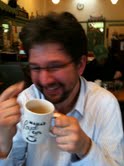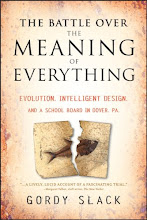 In his good essay, "Reflections On Epilepsy," in the current issue of Philosophy Now, neurologist Raymond Tallis looks at what epilepsy may reveal about the argument that consciousness boils down to various brain states. An excerpt:
In his good essay, "Reflections On Epilepsy," in the current issue of Philosophy Now, neurologist Raymond Tallis looks at what epilepsy may reveal about the argument that consciousness boils down to various brain states. An excerpt: “If neural impulses in a solitary brain were sufficient to make up a world – as opposed to simulating bits of worlds under very abnormal circumstances – then we should not be able to distinguish between having a series of epileptic fits and living with epilepsy – or, indeed, living without epilepsy. I used to shudder when I heard people with epilepsy referred to as ‘epileptics’. By identifying the patient with his brain condition, it collapsed the distance between the latter and the person who coped with it (and decided whether my advice was any good or not). This was not only dehumanizing but also metaphysically wrong.”
Tallis makes the old, basic, and I find convincing, point that brains are necessary but not sufficient conditions for consciousness. His approach is resonant with the thoughtful Berkeley philosopher Alva Noe, who argued in his book "Out of Our Heads," that we are not our brains. (See my Salon interview with Noe.) But I especially like the way Tallis, who used to run an epilepsy clinic and is also a novelist and poet, exploits his experience watching patients with seizure disorders lose and regain consciousness. Having seen hundreds of generalized seizures myself, I concur that it is when the seizing person’s mind reassembles, after the electrical storm is over and the necessary neural orchestration has been resumed, that consciousness becomes possible. But at that early postictal point, consciousness is only a possibility. Only when the person who's had the seizure is back in the world with you--maybe they blink, say a few words, ask where they are--is anyone ready to call them actually conscious.
While Tallis’s essay hardly settles the question of the identity of brain and mind, it does suggest a fresh and fascinating way to get some traction on the subject by looking at real consciousness in real people with a real disorder (epilepsy), which conducts all kinds of natural experiments that, for my research money, blow Hilary Putnam's "Brain in a Vat" out of the water.
Twenty four hundred years ago, Hippocrates’ book “On the Sacred Disease,” argued that epilepsy should be treated as a physical phenomenon and not a spiritual one. It was the birth of medical science. And efforts to understand and treat epilepsy have remained at the center of progress in neuroscience ever since. So it makes sense that epilepsy would have a lot of teach us today as science and philosophy continue to struggle to clarify the relationship between brains and minds.


No comments:
Post a Comment